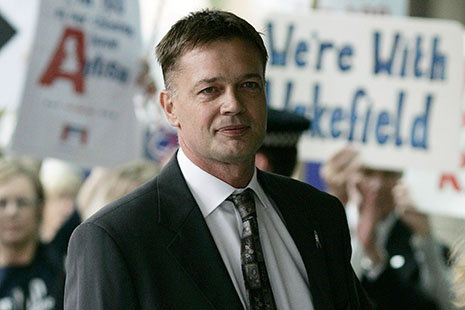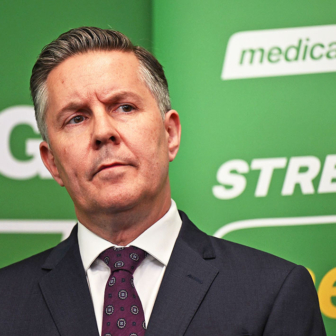ONE sidelight of the election campaign that deserves more attention is Labor’s announcement that it would deny Family Tax Benefit A end-of-year supplements to parents who fail to immunise their children, a policy that received qualified support from Tony Abbott. The announcement allows for exemptions on religious and medical grounds; it is not clear whether the latter category allows for sincere, but mistaken, beliefs about the supposed dangers of vaccines.
Before considering the details of the policy, it is worth looking at the sources of resistance to vaccination and the more general problem of combating misinformation about scientific issues of this kind. Anti-vaccination beliefs are particularly interesting because, while they have a lot in common with other anti-science beliefs (creationism, climate science denial, denial of the health effects of active and passive smoking), there are equally important differences.
To start with the similarities, the anti-vaccination campaign begins with genuine concerns about the safety of vaccines and possible links to conditions such as autism. These concerns have been investigated and found to be baseless. Those unwilling to accept the findings of science use a mixture of pseudo-scientific claims, selective quotation of genuine scientific research and conspiracy-theoretic reasoning to render themselves immune to contrary evidence. The favoured target for the conspiracy theorists in this case is “Big Pharma,” even though, in reality, vaccines are among the least profitable medicines and, by their success, wipe out markets for drugs to treat the problems they prevent. In all of this, anti-vaxerism is exactly like climate science denialism or tobacco industry propaganda.
On the other hand, whereas most forms of anti-science are associated with the political right (the big exception being spurious claims about the health risks of genetically modified foods) anti-vaccination beliefs do not have a clear-cut ideological or cultural-tribal association. In the United States, political figures as diverse as Michelle Bachmann (the far right candidate for the Republican presidential nomination in 2012) and Robert F. Kennedy Jr (a Democratic activist more notable for sharing his father’s name than for any concrete achievements) have pushed the anti-vaccination line. Mostly, however, anti-vaccine advocates have no particular political association. Anti-vaccination sentiment is found among libertarians, Christian fundamentalists, New Age believers and supporters of alternative medicine.
In Australia, the main promoter of anti-scientific misinformation is the Australian Vaccination Network. It shares with other anti-science groups a penchant for misleading names (despite its apparently neutral title, it presents only anti-vax material) but is otherwise dissimilar. AVN relies on support from fewer than 2000 financial members, and has been led, for most of the past twenty years, by a single, apparently unpaid individual, Meryl Dorey (who has been replaced this year by Greg Beattie).
By contrast, Australia’s leading anti-science organisation, the Institute for Public Affairs, has a large paid staff, and is supported by deep-pocketed donors such as Gina Rinehart and British American Tobacco. The IPA is part of a right-wing anti-science industry whose typical members have moved from denial of the health risks of smoking to dismissal of ozone depletion to conspiracy theories about climate science. The industry operates across the English-speaking world, and encompasses think tanks, “astroturf” organisations and bogus experts, ranging from complete charlatans to paid hacks. It has the active support of media organisations such as the Murdoch empire, and of political organisations such as the Republican party and (despite attempts to pretend otherwise) the Coalition parties in Australia.
There’s nothing comparable in the anti-vax campaign. A few charlatans, most notoriously a former doctor, Andrew Wakefield, have profited handsomely from exploiting anti-vaccination fears. Wakefield was struck off for falsifying research and for conflicts of interest associated with a new medical test he was trying to promote. But he is an isolated individual, not to be compared with the legion of hacks working for the tobacco and climate denial industries.
Despite its limited resources, the anti-vaccination movement has scored significant successes, if contributing to disease and death can be described as a success. Following Wakefield’s spurious claims, vaccination rates fell sharply in parts of Britain, and epidemics of measles and other preventable illnesses duly followed. In Australia, whooping cough has made a comeback, with tragic consequences.
The impact of the anti-vaccination campaign reflects the intuitive appeal of much anti-science reasoning. Injections and needles raise natural fears, as well as social taboos about bodily purity. The idea that injecting children with viruses is good for them seems profoundly counterintuitive (though, oddly enough, the crank system of homeopathic medicine is based on a superficially similar idea).
Given the inchoate nature of anti-vaccine sentiment, and the urgency of reversing recent declines in vaccination rates, what is to be done? First, it’s important to remember that the great majority of parents who may fail to vaccinate their children are genuinely trying to do the best they can to give those children a healthy life. They are unlikely to respond well to a head-on attack on their beliefs or to a dismissal of their concerns as nonsensical.
The easiest groups to deal with are those who are ambivalent about vaccination and take the path of least resistance by doing nothing. For this group, financial incentives like the proposed withholding of the Family Tax Benefit will be enough to change the default choice.
For parents who are genuinely convinced that vaccination represents a serious health risk, the medical exemption should be available. For this group, simply dismissing concerns about vaccination is probably not the most effective approach. More effective would be to use the evidence to dispel the idea that the “diseases of childhood” (measles, mumps, rubella, chicken pox, whooping cough) are no big deal. All of these diseases can have devastating effects, with a frequency far greater than any adverse reactions to vaccination. This fact needs to be publicised as widely as possible, particularly when there are breakouts of disease.
Finally, there are the hardcore advocates of anti-vax conspiracy theories. Members of this group can’t be convinced, but they can and should be discredited. It’s important to avoid giving them any platform that implies they hold a legitimate viewpoint. In particular, the spurious notion of “balance” in media coverage must be rejected in favour of a commitment to truth. The evidence in favour of vaccination is overwhelming, and should inform any media reporting about anti-vaccination organisations and campaigns.
Some but not all of this reasoning applies in relation to other anti-science activities. As far as possible it is necessary to present genuine scientific information in a non-threatening way to those who are genuinely confused, while giving no quarter to those paid to lie on behalf of the tobacco industry or in pursuit of tribalist vendettas against the environment movement. The difficulty is that the proportion of tobacco and climate “sceptics” who are honestly seeking the truth is far smaller, while the proportion of paid hacks and culture warriors is far higher. Members of the latter group will seize on any concession made to encourage genuine understanding, and will use it as evidence of weakness in the scientific position.
Despite all this, there is hope. The vast resources of the tobacco industry and the wishful thinking prompted by addiction to nicotine have, in the end, been insufficient to suppress the truth about smoking. The case for vaccination seems, at last, to be prevailing. The same will be true, sooner or later, for climate science. Hopefully it will not be too late. •




